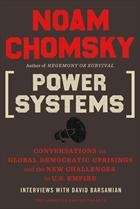Power Systems

Editorial Metropolitan
Fecha de edición enero 2013 · Edición nº 1
Idioma inglés
EAN 9780805096156
224 páginas
Libro
encuadernado en tapa blanda
Resumen del libro
A compelling new set of interviews on our changing and turbulent times with Noam Chomsky, one of the world's foremost thinkers
In this new collection of conversations, conducted from 2010 to 2012, Noam Chomsky explores the most immediate and urgent concerns: the future of democracy in the Arab world, the implications of the Fukushima nuclear disaster, the European financial crisis, the breakdown of American mainstream political institutions, and the rise of the Occupy movement. As always, Chomsky presents his ideas vividly and accessibly, with uncompromising principle and clarifying insight.
The latest volume from a long-established, trusted partnership, this collection shows once again that no interlocutor engages with Chomsky more effectively than David Barsamian. These interviews will inspire a new generation of readers, as well as longtime Chomsky fans eager for his latest thinking on the many crises we now confront, both at home and abroad. They confirm that Chomsky is an unparalleled resource for anyone seeking to understand our world today.
Noam Chomsky is the author of numerous bestselling political works, including Hegemony or Survival and Failed States. A professor of linguistics and philosophy at MIT, he is widely credited with having revolutionized modern linguistics. He lives outside Boston, Massachusetts.
David Barsamian, director of the award-winning and widely syndicated Alternative Radio, is the winner of the Lannan Foundation's 2006 Cultural Freedom Fellowship and the ACLU's Upton Sinclair Award for independent journalism. Barsamian lives in Boulder, Colorado.
Biografía del autor
x{0026}lt;P x{0026}lt;B Noam Chomskyx{0026}lt;/B es profesor emérito del Departamento de Lingüística y Filosofía del MIT, activista político y uno de los más influyentes críticos de la política exterior americana. Sus opiniones sobre el tema y su lúcida visión de los acontecimientos mundiales son discutidas ampliamente por la comunidad internacional. Es autor de numerosas obras políticas, entre ellas los best sellers x{0026}lt;I Hegemonía o supervivencia x{0026}lt;/I (2004), x{0026}lt;I Estados fallidosx{0026}lt;/I (2007) y x{0026}lt;I ¿Quién domina el mundo?x{0026}lt;/I (2016).x{0026}lt;/P








